If you’ve ever wondered whether electric cars are about to receive a major battery upgrade, you’re in for an exciting ride. The constant advancements in technology have led experts to explore new battery chemistries that could revolutionize the electric vehicle industry. From solid-state batteries to lithium-sulfur and beyond, the future looks promising for longer-lasting, faster-charging, and more energy-dense batteries. In this article, we’ll take a closer look at some of the potential breakthroughs on the horizon that could reshape the way we drive and power our electric cars. So buckle up, because the next generation of electric vehicles might be closer than you think!
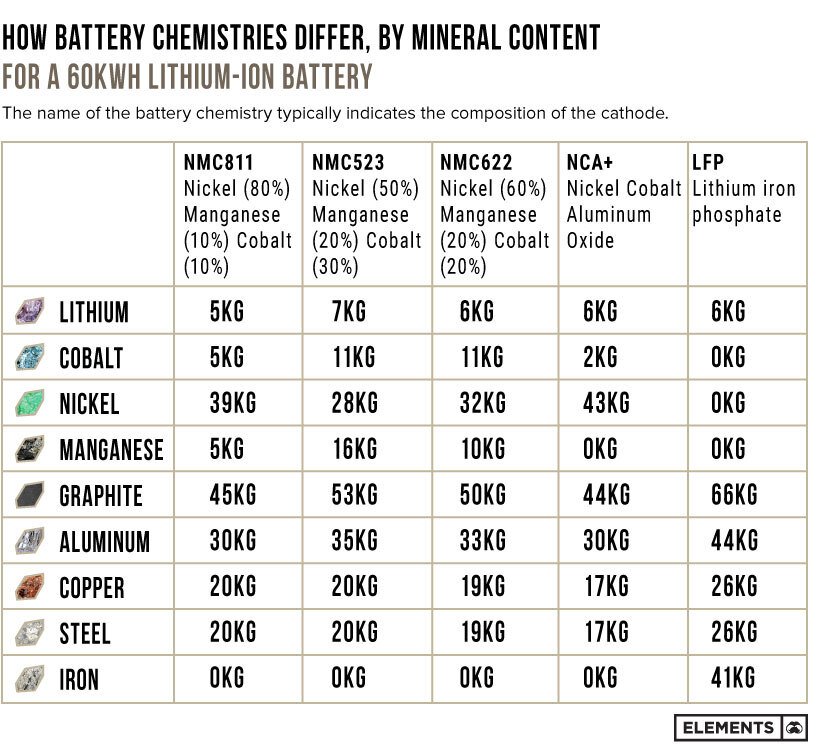
This image is property of elements.visualcapitalist.com.
Lithium-Ion Batteries
Lithium-ion batteries have become the standard choice for powering various devices, including electric cars, due to their high energy density and long cycle life. They offer numerous benefits and have become an integral part of our daily lives. However, like any technology, lithium-ion batteries also face certain challenges.
Benefits of Lithium-Ion Batteries
Lithium-ion batteries offer several key advantages that make them an attractive choice for electric cars. Firstly, they have a high energy density, which means they can store a significant amount of energy in a small and lightweight package. This translates to longer driving ranges for electric vehicles, making them more convenient and suitable for everyday use.
Furthermore, lithium-ion batteries have a quick charge-discharge capability, enabling faster charging times for electric cars. With advancements in charging infrastructure, this feature contributes to the convenience and widespread adoption of electric vehicles. Additionally, lithium-ion batteries have a long cycle life, which means they can be charged and discharged repeatedly without significant degradation in performance.
Challenges of Lithium-Ion Batteries
While lithium-ion batteries offer many benefits, there are still several challenges that need to be addressed. One of the primary concerns is the cost of lithium-ion batteries. The raw materials used in lithium-ion batteries, such as lithium and cobalt, can be expensive and subject to price fluctuations. This can make electric vehicles with lithium-ion batteries costlier than their gasoline-powered counterparts.
Another challenge lies in the stability and lifespan of lithium-ion batteries. Over time, the performance of lithium-ion batteries can deteriorate, leading to reduced energy storage capacity and overall efficiency. This degradation, known as capacity fade, limits the lifespan of the battery and eventually requires replacement.
Finally, manufacturing lithium-ion batteries on a large scale poses significant challenges. The complex manufacturing processes and the need for stringent quality control measures increase costs and limit the scalability of production. Addressing these manufacturing challenges is crucial to make electric vehicles more affordable and accessible to a wider consumer base.
Current Battery Technologies
While lithium-ion batteries dominate the electric vehicle market, several alternative battery technologies are being explored to overcome the limitations of their predecessors. Let’s take a look at some of the promising options.
Nickel-Metal Hydride (NiMH) Batteries
NiMH batteries have been widely used in hybrid electric vehicles (HEVs) before the emergence of lithium-ion batteries. They offer lower energy density compared to lithium-ion batteries but have a longer lifespan and are more environmentally friendly due to their lower reliance on rare earth metals. However, their limited energy storage capacity and slower charging times make them less suitable for all-electric vehicles (AEVs).
Solid-State Batteries
Solid-state batteries represent a significant leap in battery technology. They replace the liquid electrolyte found in conventional lithium-ion batteries with a solid electrolyte, resulting in improved safety and higher energy density. Solid-state batteries offer the potential for longer ranges, faster charging, and increased lifespan for electric vehicles. However, significant progress is still needed to overcome technical challenges and bring solid-state batteries to commercial viability.
Lithium-Sulfur Batteries
Lithium-sulfur (Li-S) batteries have shown great promise due to their high theoretical energy density, which surpasses that of lithium-ion batteries. Additionally, the materials used in Li-S batteries are more abundant and less costly than those used in lithium-ion batteries. However, several obstacles, such as the dissolution of sulfur during cycling and the formation of insulating byproducts, need to be overcome before Li-S batteries can be widely adopted in electric vehicles.
Graphene Batteries
Graphene, a single layer of carbon atoms, has garnered significant attention in the battery field. Graphene batteries offer improved energy density, faster charging times, and enhanced safety compared to traditional lithium-ion batteries. The unique properties of graphene, such as its high electrical conductivity and mechanical strength, make it an excellent candidate for battery technology. However, commercializing graphene batteries still faces challenges related to cost and scalability.
Promising Battery Chemistries
While current battery technologies continue to improve, research is also focused on developing new battery chemistries that can offer even greater benefits. Let’s explore some of these promising battery chemistries that could reshape the future of electric vehicles.
Silicon Anode Batteries
One of the most promising advancements in battery chemistry is the use of silicon as an anode material. Silicon has a much higher energy storage capacity compared to graphite, the traditional anode material used in lithium-ion batteries. By incorporating silicon into the battery’s anode, researchers aim to significantly increase the energy density and extend the range of electric vehicles. However, challenges such as silicon expansion and contraction during charge-discharge cycles need to be addressed for practical implementation.
Lithium-Air Batteries
Lithium-air batteries, also known as lithium-oxygen batteries, have the potential to revolutionize electric vehicles. These batteries utilize oxygen from the air as one of the reactants, resulting in an incredibly high theoretical energy density. If successfully developed, lithium-air batteries could offer ranges comparable to traditional fossil fuel vehicles. However, challenges related to stability, efficiency, and the development of suitable catalysts need to be overcome.
Solid-State Batteries with Lithium-Metal Anodes
Building upon the advancements in solid-state battery technology, researchers are exploring the use of lithium-metal anodes in combination with solid electrolytes. This combination has the potential to further improve energy density and safety. A lithium-metal anode can provide higher energy storage capacity than the graphite anode in traditional lithium-ion batteries. However, the formation of dendrites and the interface stability between the solid electrolyte and lithium need to be addressed to ensure safe and long-lasting batteries.
Benefits of New Battery Chemistries
The development of new battery chemistries brings a range of benefits that can transform the landscape of electric vehicles. Here are some of the key advantages offered by these emerging technologies.
Higher Energy Density
New battery chemistries, such as silicon anode batteries, lithium-air batteries, and solid-state batteries with lithium-metal anodes, promise significantly higher energy densities. This means that electric vehicles equipped with these batteries can travel longer distances on a single charge, reducing range anxiety and increasing their usability for long journeys.
Faster Charging
Another significant advantage is faster charging times. Silicon anode batteries and solid-state batteries, for example, can potentially support rapid charging without compromising battery lifespan. This is vital for enhancing the convenience and usability of electric vehicles, as shorter charging times reduce downtime and make long trips more feasible.
Improved Safety
Safety is a critical aspect of any battery technology. New battery chemistries, such as solid-state batteries and lithium-air batteries, offer enhanced safety features. Solid-state batteries, with their inherently stable solid electrolytes, are less prone to thermal runaway and potential safety hazards. Lithium-air batteries, if successfully developed, could provide better thermal stability and prevent the occurrence of catastrophic battery failures.
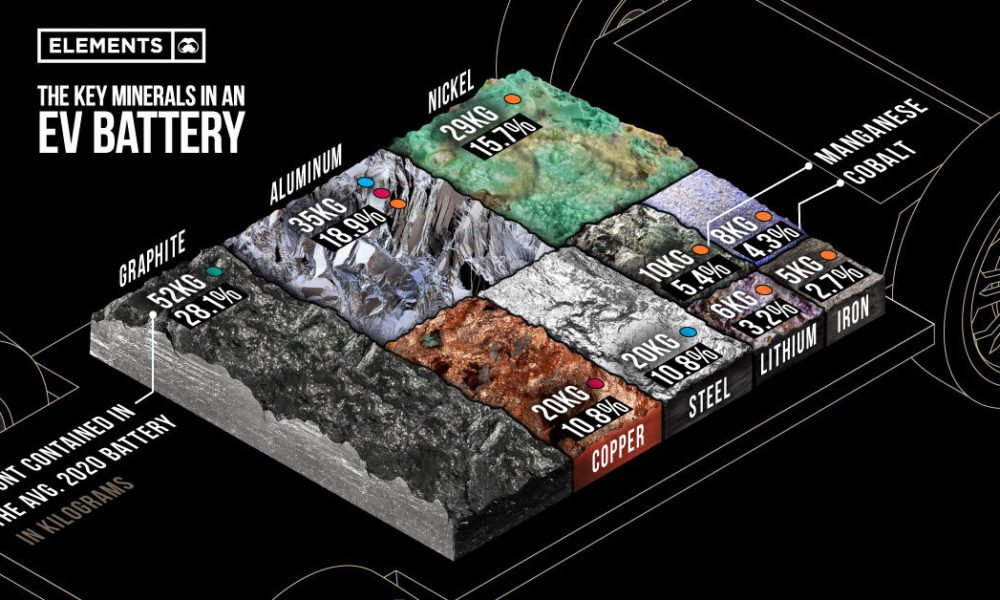
This image is property of elements.visualcapitalist.com.
Challenges and Limitations
While the potential benefits of new battery chemistries are enticing, several challenges and limitations must be overcome for these technologies to become commercially viable.
Cost and Scalability
Cost is a significant factor that influences the widespread adoption of new battery chemistries. The development and production of these advanced batteries often involve expensive and scarce materials. It is crucial to find ways to reduce manufacturing costs and enhance scalability to ensure that these technologies can be economically viable for mass production and deployment.
Stability and Lifespan
Battery stability and lifespan are critical factors in the longevity and efficiency of electric vehicles. New battery chemistries, such as silicon anode batteries, may face challenges related to the expansion and contraction of silicon during charge-discharge cycles, leading to capacity fade and decreased lifespan. Ensuring the stability and durability of these advanced batteries is crucial for their successful implementation in electric vehicles.
Manufacturing Challenges
Manufacturing advanced battery chemistries on a large scale is a complex task that requires precise control over various processes. There are challenges related to the synthesis of materials, assembly techniques, and quality control. Streamlining manufacturing processes and optimizing production techniques will be essential to achieve cost-effective and efficient large-scale production of these batteries.
Research and Development Efforts
Governments, industries, and research institutions worldwide are investing significant resources in the research and development of new battery chemistries for electric vehicles. Collaborations and partnerships between various stakeholders play a crucial role in accelerating progress and overcoming the challenges associated with these advanced technologies.
Government and Industry Initiatives
Governments around the world have recognized the importance of battery technology for the growth of the electric vehicle market and are actively supporting research and development efforts. Various countries have launched initiatives to fund battery research projects, provide incentives for battery manufacturing, and establish regulatory frameworks to promote the adoption of electric vehicles.
Collaborations and Partnerships
Collaborations between research institutions, universities, and industries are essential for sharing knowledge, expertise, and resources. Collaborative efforts can accelerate the development of new battery chemistries and ensure a coordinated approach towards solving common challenges. Partnerships between automakers, battery manufacturers, and technology companies can also lead to the seamless integration of advanced batteries into electric vehicles.
Investments in Battery Technology
Investors are increasingly recognizing the potential of battery technology and are providing financial support to innovative startups and established companies in the field. These investments drive research and development activities, leading to advancements in battery chemistries and ultimately enabling the commercialization of these technologies.
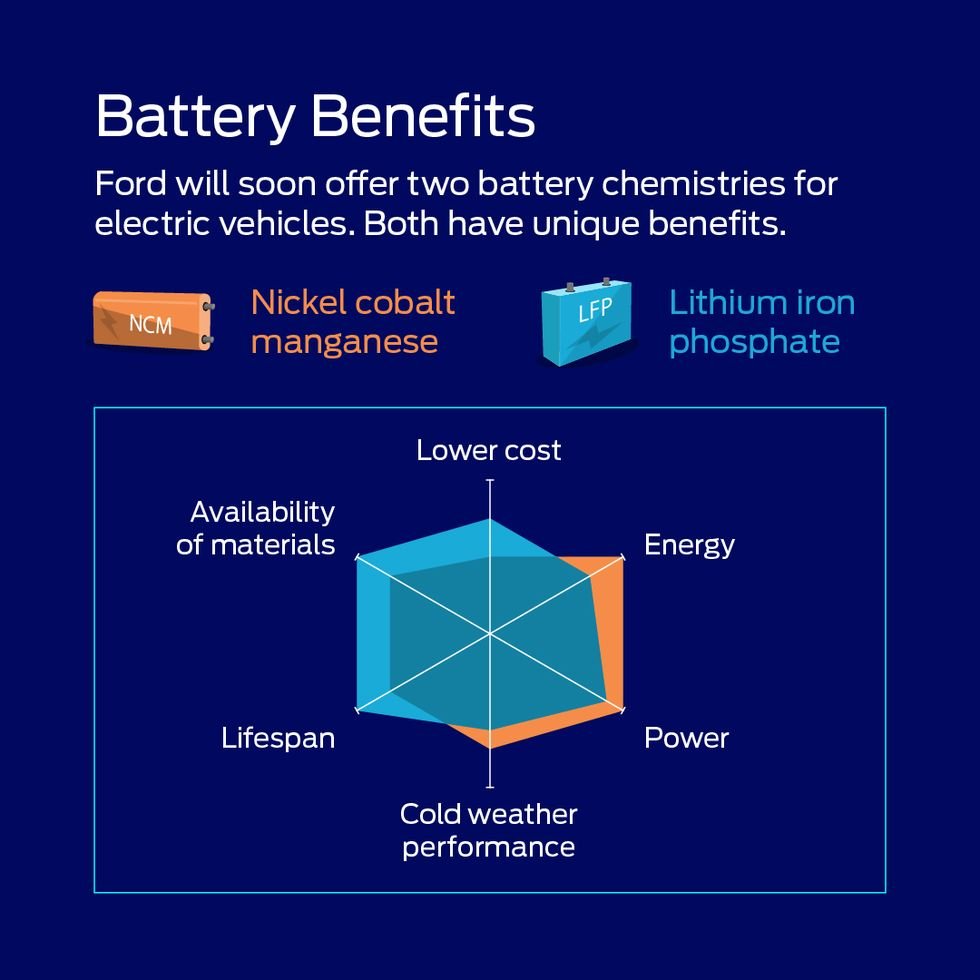
This image is property of hips.hearstapps.com.
Potential Impact on Electric Cars
The introduction of new battery chemistries has the potential to revolutionize the electric vehicle industry in several ways, significantly impacting the driving experience and affordability of electric cars.
Extended Range
One of the most significant advantages of advanced battery chemistries is the ability to provide electric vehicles with an extended driving range. Lithium-air batteries, solid-state batteries, and silicon anode batteries, with their higher energy densities, could enable electric cars to travel longer distances on a single charge. This eliminates range anxiety, making electric vehicles more appealing to a wider range of consumers.
Reduced Charging Time
Faster charging is a crucial factor in enhancing the convenience of electric vehicles. Advanced battery chemistries that support rapid charging, such as silicon anode batteries and solid-state batteries, could significantly reduce charging times. This allows for a quick top-up during breaks and enables electric vehicles to be charged more conveniently, making them more practical for everyday use.
Increased Affordability
Reducing the cost of batteries is pivotal in making electric vehicles more affordable. As new battery chemistries mature and manufacturing processes become more efficient, economies of scale can be achieved, leading to cost reductions. This will make electric vehicles more accessible to a broader population, leading to increased adoption and a cleaner transportation system overall.
Timeline for Commercialization
The commercialization of new battery chemistries for electric cars has a timeline that can be divided into short-term, medium-term, and long-term outlooks. While the exact timing may vary, it is essential to understand the general trajectory of these technologies.
Short-Term Outlook
In the short term, advancements in lithium-ion battery technology will continue to dominate the electric vehicle market. Incremental improvements in energy density, charging times, and lifespan can be expected. These improvements will further solidify the position of lithium-ion batteries as the leading choice for electric cars.
Medium-Term Outlook
In the medium term, solid-state battery technology is expected to make significant progress. Research and development efforts focused on overcoming the technical challenges and achieving commercial viability will likely bear fruit. Solid-state batteries could start making their way into niche applications, such as electric buses or high-end electric vehicles.
Long-Term Outlook
In the long term, new battery chemistries, such as silicon anode batteries and lithium-air batteries, have the potential to become viable for mainstream electric vehicles. These technologies will likely undergo rigorous research and development to address the remaining technical challenges and ensure their scalability and reliability. However, the commercialization of these advanced battery chemistries on a large scale may still be several years away.
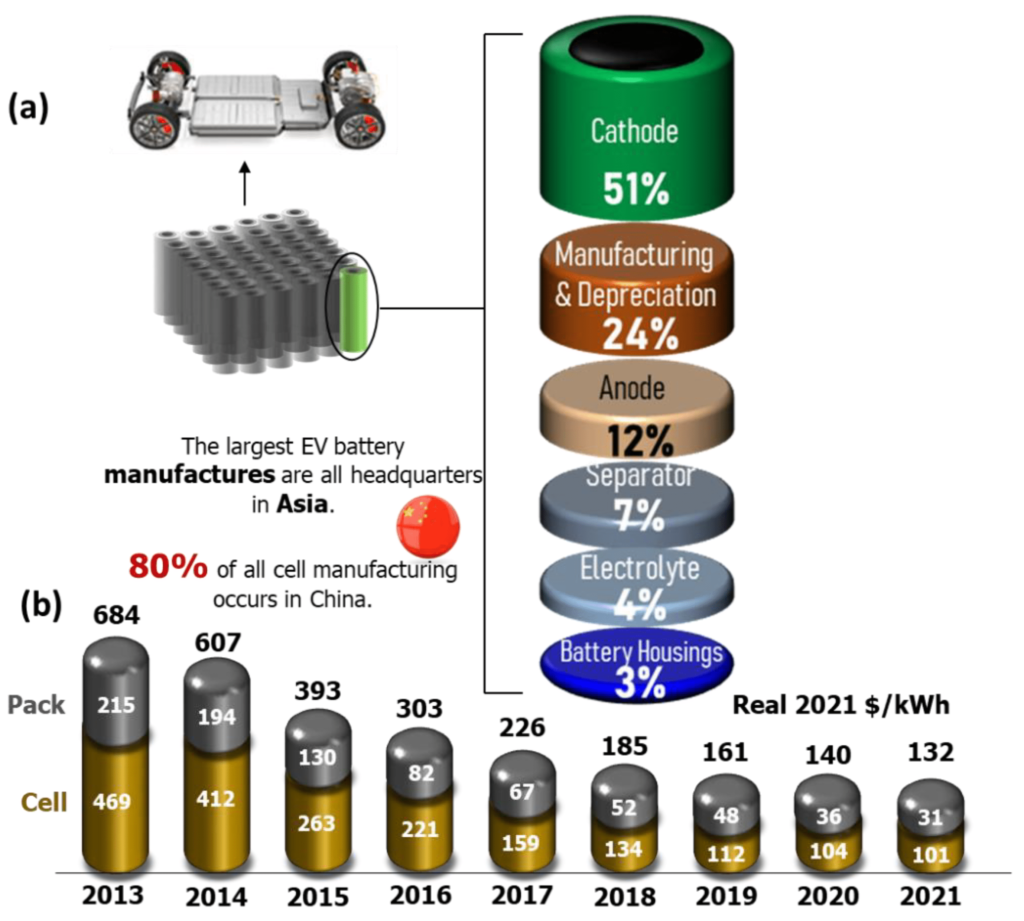
This image is property of pub.mdpi-res.com.
Future Prospects
The future of battery technology looks promising, with continued advancements expected to revolutionize the electric vehicle industry. As research and development efforts progress, several factors will shape the future of battery technology in electric cars.
Continued Advancements in Battery Technology
The field of battery technology is evolving at a rapid pace. As scientists and engineers push the boundaries of current knowledge, breakthroughs in energy storage and battery chemistry can be expected. Continued advancements, combined with the transition towards sustainability and clean energy, will pave the way for advanced battery technologies to become commonplace in electric vehicles.
Integration with Renewable Energy Sources
The integration of electric vehicles with renewable energy sources is a crucial aspect of building a sustainable transportation ecosystem. As renewable energy generation technologies, such as solar and wind, become more prevalent, electric vehicles can benefit from clean and green energy sources. The development of smart charging infrastructure and vehicle-to-grid communication systems will facilitate the seamless integration of electric vehicles into the renewable energy grid.
Conclusion
In conclusion, while lithium-ion batteries are currently the primary choice for electric vehicles, there are promising battery chemistries on the horizon that offer higher energy densities, faster charging times, and improved safety. The development of new battery technologies is driven by the need to overcome the limitations of current technologies and accelerate the adoption of electric vehicles. However, challenges related to cost, stability, and manufacturing scalability must be addressed for these advanced battery chemistries to become commercially viable. Through research and development efforts, government initiatives, collaborations, and investments, the potential impact of advanced battery chemistries on electric vehicles is significant. With extended driving ranges, reduced charging times, and increased affordability, the adoption of electric cars can accelerate, contributing to a cleaner and sustainable transportation future.
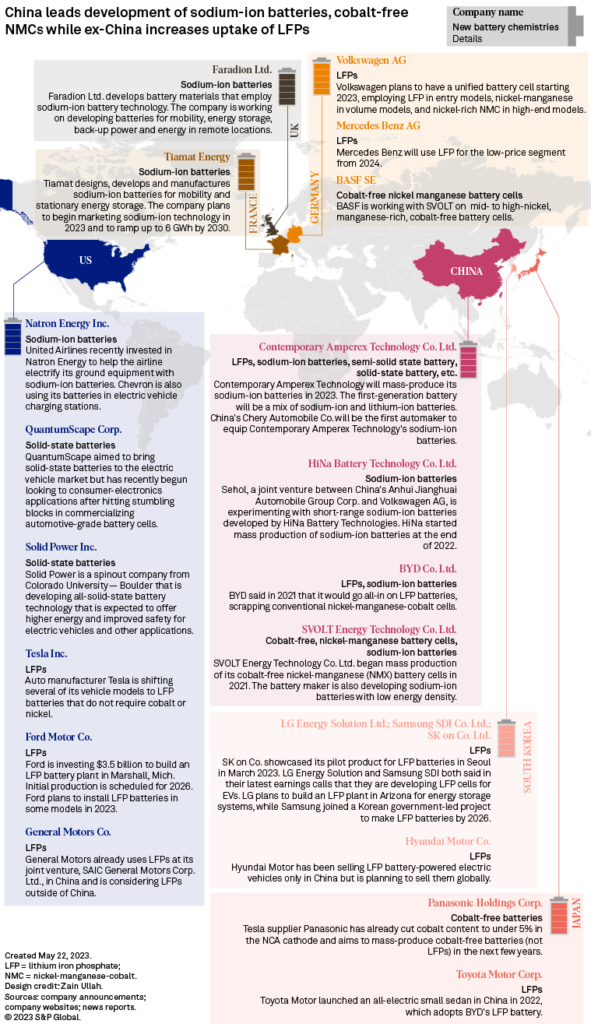
This image is property of www.snl.com.
